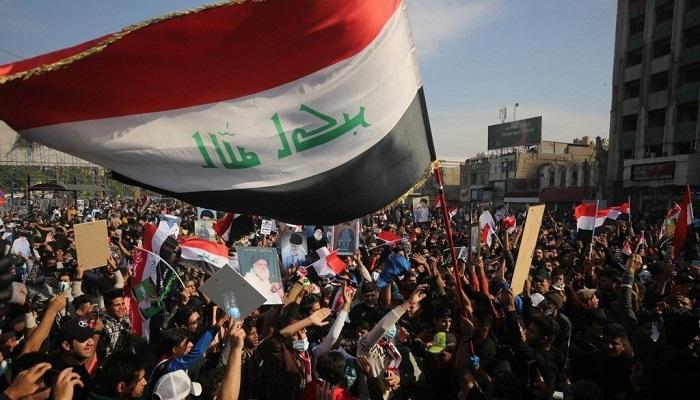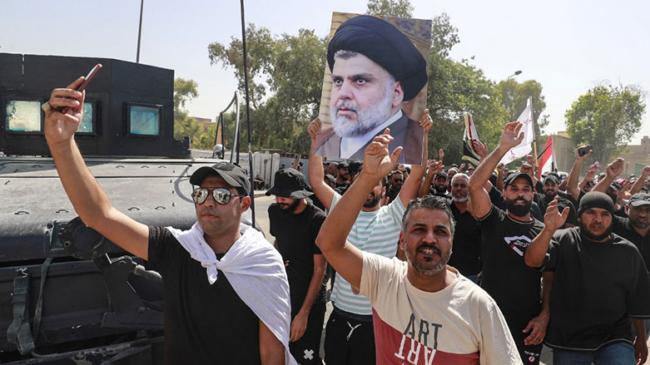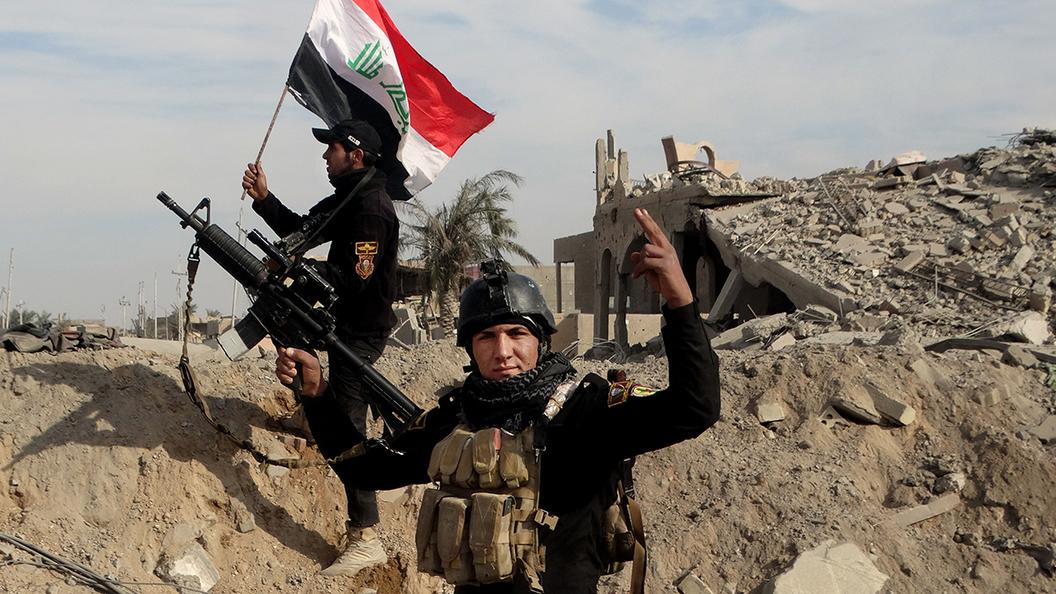Iraq: the threat of war of all against all
Analysis by Maxim Petrov
ANALYTICS 22 August 2022 - 17:06
| Maxim Petrov Caliber.Az |
Iraq is on the verge of a new civil war. This time its cause is not ISIS, an extremist organization, whose ideology is close to Sunni and Salafi Islam. Although the group retains fighting units in different parts of the country, its main forces have long been defeated. Today, a deep rift has run through the dominant Shiite camp.
Shiites make up the vast majority of Iraq's 40 million population, about 65 per cent of them. Since the overthrow by the Americans of the Sunni regime of Saddam Hussein, Shiite parties have usually controlled the government, occupying key positions in it. However, parties affiliated with minorities - Kurds and Sunnis - also gained some positions. According to the country's constitution, the president must be Kurdish and the chairman of parliament must be Sunni.

What do Iraq's rival Shiite forces want?
Iraqi parliamentary elections were held in October 2021, but so far there is no legitimate government in the country. The parties cannot agree among themselves on who and how should run the country.
Supporters of Shiite cleric Muqtada al-Sadr regularly gather outside the parliament building. Several times they have already seized the building, but then abandoned it. The Sadrists are protesting the nomination by a rival Shiite faction of its candidate for prime minister.
Since the last elections in October, the Shiite political scene has divided into two opposing camps: the Sadrists, who won the largest bloc with 73 seats, and the Coordination Mechanism, which consists of several parties and affiliated militias, a group supported by Iran. The groups are fighting both in parliament and in the streets. Both sides have organized a number of protests.
Immediately after the elections, the Coordination Mechanism (CM) organized protests against alleged electoral fraud and moved these protests to the well-protected "Green Zone," where most government buildings and foreign embassies are located. However, the Iraqi courts found no serious violations.
The Sadrists and their allies, the KDP (Kurdistan Democratic Party) led by Massoud Barzani and the Sunni Takaddum coalition led by the speaker of parliament, Muhammad Halbusi, set to work to form a majority government. If they succeeded, it would be the first precedent in Iraqi history since the overthrow of Saddam for a coalition of parties affiliated with different ethnoreligious communities to be in power. In that case, a large group of Shiite parties and affiliated militias united in the CM would have been deprived of power.
But the parties that are part of the CM cannot allow Sadr's plan to succeed. The question of power (they insist on forming a single government with the Sadrists, in which the CM members would be given a number of key positions) is of great importance to the CM, and here politics is closely intertwined with economics.
The political system and the economy in Iraq are intertwined in ways that promote confrontation. First, the Shiite parties that make up the CM are supported by armed militias, the CNM (Popular Mobilization Force). They range in size from 50,000 to 100,000 men. They were originally created to fight ISIS. Most of them were created around pro-Iranian groups, and they are politically, ideologically, and financially oriented towards Iran. However, although the militias are supported by Iran, they are officially part of the Iraqi regular army and are paid by the Iraqi government. If they lose power, they could also lose their livelihoods, or at least make it much harder for them to pay their fighters' salaries.
Secondly, the issue of power is of key importance because Sadr and his supporters have long advocated the dissolution of the militias and the concentration of all military capabilities in the hands of the army and the federal police. If implemented, such plans could lead to a real upheaval in Iraqi politics. The militias control a number of provinces and government agencies, including the Interior Ministry, most of whose personnel are associated with the Badr militia and its leader Hadi Amiri. The militias have taxed Iraqi businesses and controlled many of the country's communications, including some border crossings. In fact, they are a parallel state created with the support of Iran. At the same time, they have for many years had a powerful influence within the official state. In addition, the militias are often better armed than the Iraqi army, for example, they are armed with the latest Russian tanks. If the militias and their allied forces lose central authority, it would be a big disaster for them. On the other hand, taking power away from them is not an easy thing to do, given such backgrounds.
Third, the main wealth in Iraq belongs to political parties. Controlling the ministries and agencies, the parties share the financial flows, including the huge revenues from oil exports (Iraq is the world's fourth largest oil exporter). This is one of the reasons for the extreme poverty of the population of the oil-rich country. The loss of power means for the Shiite factions in the CM also the loss of a large part of the oil revenues.

The failure of the attempt to create a coalition
Based on all these considerations, having a blocking third in the parliament, the CM did not allow the Sadr-Halbusi-Barzani alliance to elect a president. Meanwhile, it is the president who, according to Iraqi law, must propose the country's key political figure, the prime minister. No first, no second. The ambitious plan of Sadr and his allies has collapsed.
The Sadrists withdrew from parliament in June. They said that since they, the victors, were prevented from forming a majority government, they saw no point in attending any more parliamentary sessions. According to Iraqi law, if an MP leaves, his seat is taken by whoever wins second place in his constituency. As a result, after the Sadrists left, the Coordination Mechanism became the largest parliamentary bloc, gaining about 40 additional seats. They proceeded to form a government by nominating Mohammad Shia Sudani as prime minister.
The move angered Sadrists because Sudani is close to former Prime Minister Nouri al-Maliki, who has long been in conflict with Sadr. Maliki's party, the Rule of Law, is part of the CM. But it's not just that. Tapes have been made public in which Maliki says he is ready to destroy his Sadrist opponents. The Sadrists took to the streets and occupied parliament, preventing the CM from forming an anti-Sadristic government. The Coordination Mechanism organized its own protest against the Sadrists.
What do the parties want?
After the Sadrists stormed parliament, their leader Muqtada Sadr called for the dissolution of parliament and early elections. Sadr is asking the federal court to immediately dissolve parliament for failing to form a new government and for the current government to organize early elections.
According to the Iraqi constitution, the dissolution of parliament requires a demand of the prime minister, the president, or a third of the legislature, as well as an absolute majority vote in parliament. The president must then call early elections within 60 days of the dissolution.
Although the Coordination Mechanism expressed agreement with Sadr's demand, it asked Sadrists to return to parliament to form a new government, which would then dissolve itself and prepare for early elections. Sadr rejects this idea.
The CM is also seeking amendments to the electoral law and a return to the manual vote counting system instead of the electronic system adopted in the last elections. Also, member parties of the Coordination Mechanism accuse the Independent High Electoral Commission of fraud and electoral fraud. Sadr rejects all these changes and proposals, as well as the CM's proposal to form a consensus government with Sadrists.
But even if early elections are held, it is unlikely that anyone will win enough votes in them to form a government alone, and the situation will be back to square one.

What is the current Iraqi government doing under these circumstances?
Amid tense conflict, Prime Minister Mustafa al-Qadimi last week called for dialogue without preconditions, threats, or violations of the law. Qadimi has held regular meetings with political leaders from all sides to prepare for a national dialogue, but there is still a long way to go before the goals are achieved as the two rival factions increasingly attack each other in the streets and in the media.
Expanding the confrontation's boundaries
Sunnis and Kurds in Iraq now fear that the fight between the Shiite groups could spill over into their regions. There are a number of reasons for this.
First, the Shiite split is no longer limited to central and southern Iraq, the zones of influence of Shiite parties, and the regions where most Shiites live. The effects of the split are now also felt by Sunni and Kurdish parties in the north and west of the country. PMF militias have spread their influence in some of the Sunni and Kurdish areas that they control. As for Sadr, it has its own armed militia, called Saraya al-Salam, which can number up to 15,000 fighters.
Second, the Kurdish and Sunni communities are also split. Both Shiite factions have armed supporters and armed opponents within them. In the event of a civil war, these groups could start fighting for influence within their communities. Fears about this are shared by some Shiite politicians and armed leaders. A Shiite political source close to Iranian-affiliated armed groups told Al-Monitor: "If there is a Shiite-Shiite battle, it will also happen between Sunnis and Kurds (within their communities). Some politicians in the Kurdish and Sunni communities have anticipated this moment and see it as an opportunity to confront powerful figures within their communities."
Third, it is not known how the Iraqi army might behave if an armed struggle breaks out. Shiite generals play a key role there. Sunnis are also sometimes given high positions, but in practice, they do not lead anything. There is no guarantee that a split within the Shiites won't go through the army. On the other hand, in theory, the army could become a stabilizing force. But in that case, wouldn't that mean that Iraq would revert to a military dictatorship reminiscent of Saddam Hussein's time? There are many people in the country who are nostalgic for that era, so such an option cannot be completely ruled out.
Perhaps the Shiite parties will agree among themselves on another division of power. After all, this has happened in the past and more than once. This would mean that what is happening today is positional inter-party bargaining, in which people are escalating the situation and gaining a price, in order to divide up the bread-and-butter in the ministries and the financial flows.
But for now, the country is following a confrontational scenario.
Caliber.Az
|
1
|
High time to declare US ambassador persona non grata Mr. Libby, take your suitcase and leave for Washington
05 May 2024 - 12:06
|
|
2
|
Sports & Lake Urmia as tools in fighting for Azerbaijani national identity in Iran Identity struggles: Sports & environment
07 May 2024 - 16:46
|
|
3
|
West destabilising situation in Georgia Security, impunity for (foreign) agents
05 May 2024 - 17:28
|
|
4
|
Double standards and Michel's confession Europe's hypocrisy
05 May 2024 - 11:18
|
|
5
|
Armenian priests peddling false narratives Unmasking revanchist rhetoric
05 May 2024 - 14:57
|
Germany sends two warships to Indo-Pacific amid China and Taiwan tensions
08 May 2024 - 01:20
US says Israel committed to reopening Kerem Shalom crossing on May 8
07 May 2024 - 23:23
NATO special rep meets Armenian diplomat to mull cooperation & regional dynamics
07 May 2024 - 21:31
Baku hosts 7th high-level working group meeting on Caspian Sea issues
PHOTO07 May 2024 - 21:10
Uzbek president to pay working visit to Moscow on May 8-9
07 May 2024 - 20:59
US FAA opens probe into Boeing 787 inspections
07 May 2024 - 20:47
Iraqi Kurdistan not to be a center to threaten Iran security
07 May 2024 - 20:32
FIFA president invited to COP29
PHOTO07 May 2024 - 20:25
Pakistani delegation visits Azerbaijan National Defence University
PHOTO07 May 2024 - 20:14
Azerbaijan chairs BSEC meeting on tourism cooperation, focuses on regional development
07 May 2024 - 20:07
Azerbaijani migration service detains 785 foreigners in crackdown on illegal migration
07 May 2024 - 19:53
Gunfire breaks out on Kyrgyz-Tajik border
07 May 2024 - 19:35
Azerbaijani PM visits monument to national leader Heydar Aliyev in Ankara
PHOTO07 May 2024 - 19:25
Guterres urges Israel, Hamas "to show political courage" and secure ceasefire
07 May 2024 - 19:17
Israeli forces conclude operation in Tulkarem
VIDEO07 May 2024 - 18:50
Slovak premier wraps up visit to Azerbaijan
07 May 2024 - 18:38
Belarus conducts tactical nuclear inspection together with Russia
07 May 2024 - 18:26
Poland calls on EU to build joint air-defence system
07 May 2024 - 18:14
French MFA summons Russian ambassador over misuse of diplomatic channels
07 May 2024 - 18:02
Prime Minister Ali Asadov visits Anitkabir mausoleum in Ankara
PHOTO07 May 2024 - 17:59
Ukraine exposes network of Russian agents plotting assassination of president Zelenskyy
PHOTO07 May 2024 - 17:50
Russia reserves right to target British military sites
MFA spox warns07 May 2024 - 17:39
Armenian PM alleges Catholicos leads political movement
Favoring ex-president Kocharyan's interests07 May 2024 - 17:27
President Aliyev holds expanded meeting with Slovak PM
PHOTO07 May 2024 - 17:15
Armenia's Pashinyan affirms commitment to peace talks despite mediator ineffectiveness
07 May 2024 - 17:03
Will foreign troops save Ukraine?
Breaking through07 May 2024 - 17:00
Putin formally takes office as Russian president for six-year term
07 May 2024 - 16:52
Sports & Lake Urmia as tools in fighting for Azerbaijani national identity in Iran
Identity struggles: Sports & environment07 May 2024 - 16:46
Argentina welcomes Baku-Yerevan delimitation process
07 May 2024 - 16:40
Bulgarian President Rumen Radev arrives in Azerbaijan for official visit
07 May 2024 - 16:30
Armenian Church's political aggression threatens regional peace
Caliber.Az on YouTube07 May 2024 - 16:28
Azerbaijan, Russia focus on climate finance
07 May 2024 - 16:25
Armenian PM, Russian president to discuss diverse agenda in upcoming meeting
07 May 2024 - 16:16
Georgian Parliament to consider law on foreign agents in final reading
07 May 2024 - 16:04
Сan Middle East knot be cut?
Israeli analyst weighs in07 May 2024 - 15:53
Turkish-Iraqi relations forge new paths with “Road to Development” initiative
Shaping Middle East landscape07 May 2024 - 15:40
Limited Israeli operation in Rafah aims to keep pressure on Hamas to agree deal
Sources tell CNN07 May 2024 - 15:28
Slovak PM: Azerbaijan is exemplary in terms of sovereignty
07 May 2024 - 15:16
Pashinyan supports proposal to sign peace treaty with Baku by November
07 May 2024 - 15:14
Armenian PM accuses former security chief of collaborating with foreign press service
07 May 2024 - 15:04
